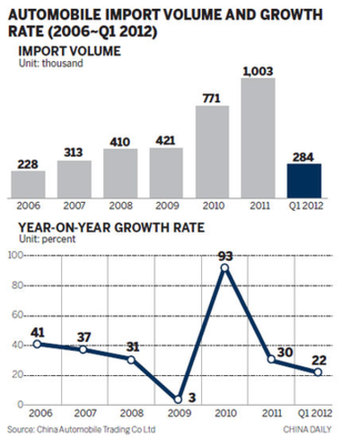
China's automobile import growth slowed in the first quarter, but the segment is expected to maintain reasonable growth in the next few years.
Customs statistics show that in the first three months of the year, China imported 284,000 vehicles, 21.7 percent more than in the same period last year.
"It's a normal and healthy rate," said Wang Yanxue, an auto analyst with Huachuang Securities. He predicted 20 percent growth in vehicle imports for the whole year and 1 million plate registrations.
"The growth will be twice the number of locally produced passenger vehicles," said Wang.
"The upgrading of China's automobile market and the stable economic environment mean that imports will continue to enjoy reasonable and rational growth over the next few years."
According to the China Association of Automobile Manufacturers, China's vehicle import sector maintained an average year-on-year growth rate of more than 30 percent over the past decade.
|
 |
"The sector is now entering a period of structural readjustment, with a growth rate of around 20 percent," said Wang.
According to China Automobile Trading Co Ltd, China's major vehicle importer, the high-speed growth of the sector in the past years was supported by China's booming demand for luxury cars and sport utility vehicles.
In 2011, the imported SUV segment surged 35 percent to 539,000 units, taking a 53.3 percent share of the import market, and passenger cars accounted for 40 percent and multi-purpose vehicles took 5 percent.
Although the booming imported SUV segment slowed in the first quarter as some major models were replaced by locally produced ones, and there was a shortage of other models due to version upgrades, Wang said that the SUV segment's market share will remain over 50 percent in the long term.
Statistics from CAAM show that 441,600 SUVs were sold in China in the first quarter, up 18.05 percent year-on-year.
The growth dipped slightly from last year's 20 percent. The sector accounted for 9 percent of China's overall vehicle market, and 11 percent of the country's passenger vehicle sales.
"The increasing demand for multi-functional SUVs and the automakers' engine downsizing strategy as a result of fuel efficiency and emission reduction considerations will help the segment maintain its leadership in the imported sector," said Wang.
Benefiting from the segment's popularity, Jeep and Land Rover, two major global SUV suppliers, led the import sector in the first quarter, with year-on-year growth rates of 567.6 percent and 127.7 percent, respectively. They were followed by 111.6 percent growth reported by Porsche, More than half of its sales came from imported SUVs.
Another feature of the import sector is the trend toward luxury, said China Automobile Trading. The market share of luxury brands in the import sector increased to almost two-thirds in the first quarter, said the company.
Fitch Ratings said in a recent report that China's high-end vehicle market grew at a faster annual clip between 2006 and 2011, at 55 percent compared with the mid-market's 23 percent.
Fitch expects the luxury segment to maintain growth of over 20 percent in 2012 and 2013, due to the low penetration of luxury vehicles and an expanding upper-middle class.
The surging demand has made China the largest market for the German luxury brands Audi and BMW, as well as the Italian sports car brand Lamborghini. It's also the second-biggest market for Ferrari and third-biggest for Mercedes-Benz and Volvo.
lifangfang@chinadaily.com.cn